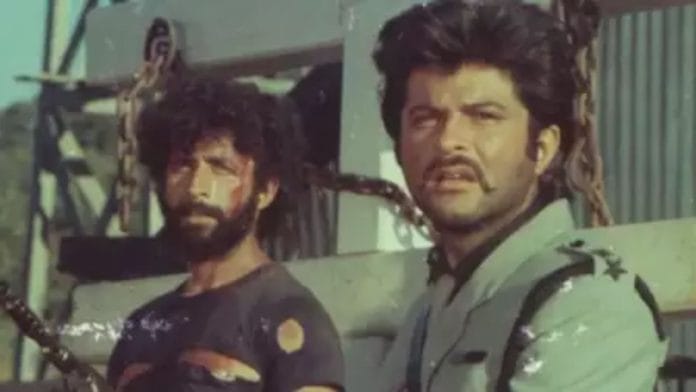In Atlee’s Jawan, Shah Rukh Khan plays a jailer who makes it his mission to empower the female inmates, and also train them to fight against the corruption ailing the country. It’s not a new plot.
Nearly four decades ago, Subhash Ghai’s multi-starrer film Karma (1986) also looked at a similar theme. The jailer, Rana Vishwa Pratap Singh (Dilip Kumar), trains three convicts Baiju Thakur (Jackie Shroff), Johnny (Anil Kapoor) and Khairuddin (Naseeruddin Shah) to fight against the terrorist Dr Dang (Anupam Kher).
Karma was a staple feature in the collection of Republic Day and Independence Day special films shown on Doordarshan. The film opens with Rana addressing inmates, and taking an oath to serve one’s country, and rising above religion and caste. The Indian flag with portraits of Bhagat Singh and Subhash Chandra Bose serves to underscore patriotism.
And just in case, the viewer misses this theme, there’s the song, Aye Watan Tere Liye. Sung by Kavita Krishnamurthy and Mohammad Aziz, it carries a similar message through its lyrics. In one version of the song, even Dilip Kumar lends his voice. It became a staple patriotic song in the ’80s and ’90s and was played endlessly on radio.
Karma shows how the happy family of Rana, with his wife Rukmini (Nutan), two sons and grandchildren is targeted by Dr Dang. Imprisoned in Rana’s jail, he has no desire for reform and is incensed at not being given special treatment.
The revenge drama however manages to move beyond the personal and also brings in the nation and how India needs to be protected from evil terrorists.
Women as props
Ghai’s concept was interesting because Karma was not simply about jingoism. The film has patriotism at its core, but also advocates that most criminals are misguided or victims of their circumstances. That they can be reformed. It explores the friendship between Baiju, Johnny and Khairuddin, and Rana making them a part of the family eventually.
But the female characters were a letdown–reduced to props for the heroes. Nutan is weeping in every scene. And once Dr Dang kills her sons, Radha (Sridevi) and Tulsi (Poonam Dhillon) have minimal screen time except when dancing with their respective lovers Johnny and Baiju.
However, the mix of actors, drama, revenge and high-octane action ensured that Karma was the highest-grossing movie of the year, and one of the top grossers of the decade.
Also read: Kamal Amrohi’s ‘Razia Sultan’ lacked the magic of Pakeezah. Only opulence, no substance
‘Pathan ka haath’
Karma was also part of Ghai’s creative collaboration with Dilip Kumar in the 1980s and 1990s. Ghai directed Kumar in Vidhaata (1982), and Saudagar (1991). Saudagar won Ghai the first and only Filmfare Award for Best Director. He also introduced Jackie Shroff as a leading actor in Hero (1983) and helped establish Anil Kapoor’s career with Meri Jung (1985). These two actors would also be part of his subsequent films with ensemble casts like Ram Lakhan (1989) and Trimurti (1995).
Anupam Kher as Dr Dang gives off a James Bond-like larger-than-life character, and excels in the role. The transformation from his cheerful demeanor, boasting about always living life king-sized even in jail, to his intense hatred and desperate need to teach Rana a lesson after being slapped, is particularly striking. Dilip Kumar excels as the man on a mission to reform criminals, embodying an iron-willed figure determined not only to avenge the deaths of his sons but also to combat a threat to the nation.
In an interview, Kher shared how he was completely in awe of Kumar, with whom he was working for the very first time. Kher asked Kumar to slap him hard for the scene that eventually makes Dang kill Rana’s family in the film. But Kumar warned him against it. “Dilip Sahab told me, ‘Ye Pathaan ka hath hai, moh tedda hojaega (This a Pathaan’s hand, your face will get disfigured)’.”
When Karma completed 37 years in 2023, Kumar’s wife Saira Banu shared a photo of her husband and Ghai on Instagram.
“Sahib’s artistic union with Subhash Ghai not only resulted in cinematic triumphs but also solidified their close bond, reflecting the impact of their creative journey together,” wrote Banu.
(Edited by Ratan Priya)






